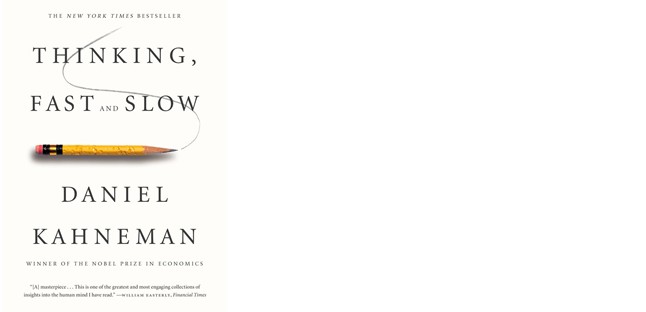Latest posts
A masterclass in creating value
What’s going on at parkrun?
Virtue-signalling all the way to the bank
Bud Light: brand purpose or virtue-signalling?
The Coddling of the American Mind, by Greg Lukianoff and Jonathan Haidt
Belonging, by Owen Eastwood
Such a simple thing
The Long Win, and The Scout Mindset
The Cult of We by Eliot Brown and Maureen Farrell
Coffee and covid modelling
By theme
Marketing strategy
Insight & metrics
Innovation & inspiration
Brand & positioning
Marketing communications
Business purpose
Leadership
By industry sector
Financial services
Retail
FMCG
Technology & start-ups
Consumer services
Business to business
Other sectors
By type
Books
Comment
Quotes
Thought leadership
You get a concept a chapter in this packed book, which covers two broad areas: how the human brain/ mind makes judgements, and how we make choices (aka behavioural economics). Fast thinking is when our automated processor steps in, which is the default because slow thinking – that’s to say, really thinking – is effortful. Trouble is, we mostly aren’t aware which thinking mode we are using, nor of the errors the fast thinking mode can make. The most striking, and original, aspect of this book is the demonstration of the many errors of judgement we can make, either through one of the fast thinking shortcuts – and remember you don’t know you’re doing it – or through how memory works. There’s lots available on behavioural economics (look for books with one-word titles: Nudge, Herd, Freakonomics), a lot less on the thinking stuff; for more of that, read psychologist Guy Claxton’s “Hare Brain, Tortoise Mind”.
Latest posts
A masterclass in creating value
What’s going on at parkrun?
Virtue-signalling all the way to the bank
Bud Light: brand purpose or virtue-signalling?
The Coddling of the American Mind, by Greg Lukianoff and Jonathan Haidt
Belonging, by Owen Eastwood
Such a simple thing
The Long Win, and The Scout Mindset
The Cult of We by Eliot Brown and Maureen Farrell
Coffee and covid modelling
By theme
Marketing strategy
Insight & metrics
Innovation & inspiration
Brand & positioning
Marketing communications
Business purpose
Leadership
By industry sector
Financial services
Retail
FMCG
Technology & start-ups
Consumer services
Business to business
Other sectors
By type
Books
Comment
Quotes
Thought leadership
